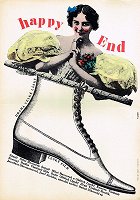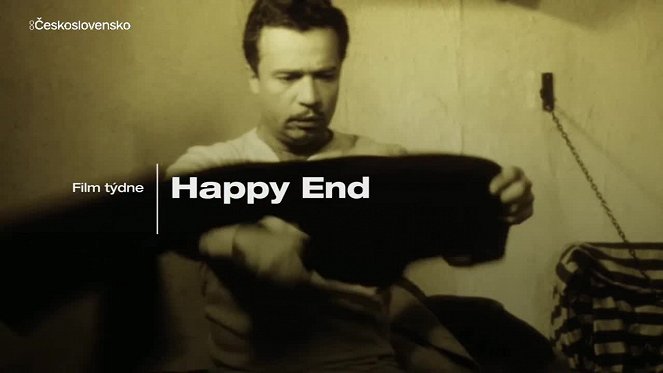Reżyseria:
Oldřich LipskýZdjęcia:
Vladimír NovotnýMuzyka:
Vlastimil HálaObsada:
Vladimír Menšík, Jaroslava Obermaierová, Josef Abrhám, Bohuš Záhorský, Stella Zázvorková, Jiří Steimar, Martin Růžek, Bedřich Prokoš, Josef Hlinomaz (więcej)Opisy(1)
The edge of the guillotine separates the condemned man's head from his trunk, but the head immediately jumps back and unites with the body and the butcher Bedřich Frydrych comes back to life. With a good deal of temperament, he begins to tell his story "backwards" and returns to the events preceding his execution - as far back as to his dramatic first meeting with his future wife Julie. - At the court, Bedřich is sentenced to death for the murder of his wife. He was caught by a constable, while he was carrying her quartered body in a suitcase. The following sequence describes - through running the camera backwards - the "assembly" of his wife's body into its original state and the story continues to the beginning of Bedřich's life. He lives comfortably with Julie but a wild jealous scene reveals that Julie is unfaithful to him. Bedřich searches out his wife's lover, a Mr Ptáček whom he had heroically saved from drowning during their honeymoon by the sea. Bedřich's marriage with Julie is preceded by his split with his lover. Although Julie's mother agrees with the wedding, the girl attempts to commit suicide. The story goes back to the beginning, to the first acquaintance of Bedřich with Julie, who saves Julie from a fire. In the film, however, it looks as if Bedřich threw Julie into the fire; then he descends the ladder and, by kissing the hand of his former lover, attains a happy end. (oficjalny tekst dystrybutora)
(więcej)Recenzje (6)
In accordance with an unwritten agreement with the viewer, a significant part of fictional films respects certain narrative rules. The effect is preceded by the cause, the answer by the question, the end by the beginning. Happy End adapts those deep-rooted rules to its own, topsy-turvy world. ___ The game-like framing of the whole film is brought to our attention by the opening credits. The first words to appear are “the end”. This is followed by the notice “presented by Central Film Rental in Prague”. From a certain moment, the traditional credits are replaced with text written in mirror image and then reversed. Meanwhile, the opening shot of the film is pieced together like a puzzle against the background of text. The resulting image, Vladimír Menšík’s head separated from his torso, then requests our participation with a roguish wink. The filmmakers are fooling around and, at the same time, inviting us to join in. ___ Bedřich justifies all of the crimes that he has committed by judging the whole story within the parameters of a murder ballad according to his own inverted logic. As the narrator of the whole story, he doesn’t allow an alternative interpretation that would make him guilty. His de facto commentary is not in direct conflict with what has been seen, but it denies the generally accepted criteria for what is considered permissible and right. Does Bedřich thus automatically become an unreliable narrator who bends the truth based on his own personal interests? Or is he telling the truth as it exists in his own universe? ___ If formalistic games break the narrative coherence of the story, the objects in the mise-en-scene serve for the comprehensibility of the plot and the characterisation of the characters. The filmmakers also imaginatively play with the soundtrack. Printed words sometimes absurdly describe what we hear (“click-clack”), thus serving the same purpose as intertitles in a silent film, and what we see (“hand”, “head”, “foot”), thus accentuating the attractive nature of some scenes. In all instances, this involves the use of sound in a manner different from what we are generally accustomed to – sound does not complement the information conveyed by the image, but rather duplicates it. These oddities have a comical effect and contribute to the assessment of Happy End as a film whose guiding principle is a purposeful inversion of the logic that we are used to from ordinary films. ___ As in the early years of cinema, the medium of film is used through Happy End in the manner of a fairground attraction for the general public’s entertainment. Several times, the narrative flow is imaginatively suspended and the integrity of the narrative is violated in order to offer us stimuli reminiscent of the aforementioned fairground attractions, arousing wonder or amazement at the possibilities of the medium of film (the graphically depicted dismemberment of the wife, the several minutes of pulling cakes out of a mouth, the jumping out of water). Despite the presence of a simple story, Happy End sometimes resembles a series of attractions from which the first cinema operators compiled their programmes. Nevertheless, the demands placed on the recipients of audiovisual content are incomparably higher than in the era of the cinema of attractions. The alternation of narrative and attraction-based organising principles makes it impossible to perceive what is seen exclusively through the stimulation of the senses. Due to the reverse sequence, we also have to constantly evaluate the images and sounds and actively think about them. Similarly, the film is not satisfied with having only a superficial comedic effect. The image and the diegetic sound force us to think in reverse; conversely, Bedřich’s monologue corresponds to the chronological understanding of things. The constant switching between these two modes of reception and the backwards assigning of points to what was said previously place relatively strong demands on the viewer’s attention. At the same time, however, the ceaseless returning to the actions performed by the actors and the words that they have spoken does not make it impossible to watch the film as a comedy whose humour is immediately comprehensible. In a certain sense, Happy End works both ways. It is a unique work not only in the context of Czechoslovak cinema. By establishing its own rules and concurrently refusing to follow any rules, Happy End is a unique transference of Dadaist poetics to film. 85%
()
(mniej)
(więcej)
A sad lifetime seen backward. The picture doesn’t only rely on showing an ordinary situation backward somewhat slapstick style. That would get boring pretty quickly. It creates its own world of genius, with its own rules and humor, where the visual comedy of regular situations played back inside out really is just one of its winning aspects. And that is where Happy End differs from many other pictures with a similar idea. And it’s all underpinned by the genius narration by the “newborn" Vladimír Menšík. amenic hcezC fo eceip lausunu A. Oldřich Lipský’s best movie. Really.
()
If Happy End was filmed today, it would become a sensation and would tour a few festivals, eventually entering the Oscar race. There would be talk about it in superlatives and international feedback would surpass domestic praise. However, at the time of its premiere, the audiences in movie theaters rewarded it with polite disinterest and saw it more as a curiosity, without any significant reactions, and surprisingly, even the film critics let it fizzle out. In the following decades, it was not utilized by television either, so it remained hidden from the wider public for a long time. It is a clever playful experiment, where the story is told in reverse. It has finely crafted and coordinated dialogue that, when juxtaposed with the events on the screen, usually gains a secondary ironic meaning. The biggest mystery associated with Happy End for me is why I don't feel like giving this entertaining game of cruelly punished infidelity the highest rating. Overall impression: 85%.
()
Perfect piece of work. In the 1960s, Czech cinema was so advanced that even the Americans should take out their notebooks and organize professional screenings of films like Happy End. The amazing actors are overshadowed by a unique script where characters walk backwards, broken objects are mended, food comes out of mouths back onto plates, and everything comes together to form a story that intertwines with the real, "forward-moving" one in a truly admirable and thoughtful way. And of course, as is usual with Lipský, the whole thing is smart, funny and exaggerated. It’s certainly not the best, but thanks to the originality of the premise, it’s the most interesting Czechoslovak film ever made. At least now we know where Nolan may have gotten some of his inspiration for Memento :D 95%
()
The equivalent of a stoner party where every word is used as a pun and taken out of context just for an instant burst of laughter. At the same time, the film is quite surprising in its morbidity (you can’t put Otýlie Vranská back in the box), its naturalism (the slaughterhouse), and how manic it is in its infantilism. A great combination.
()
Sometimes you really wonder what treasures you will find in Czech cinema. An incredibly intriguing concept of telling the story in reverse, but with the twist that it's used for an engaging narrative where dialogues reign supreme, and thanks to the reverse chronology, they are very witty. The acting is excellent. The Czechs had some really great and innovative creators.
()

